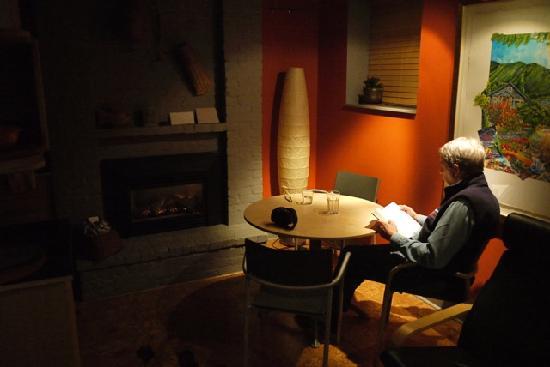 Whew, time to move on to another blog topic. My last post stirred up a bit of the hornet’s nest—in some ways, rightly so. Which is what prompted me to write this blog. There were several comments to my <challenge whose name shall not be spoken> blog that really got me to thinking. None more than those that questioned my feeling toward new writers (the general consensus being that I discourage them, am not supportive, and otherwise should have my head examined).
Whew, time to move on to another blog topic. My last post stirred up a bit of the hornet’s nest—in some ways, rightly so. Which is what prompted me to write this blog. There were several comments to my <challenge whose name shall not be spoken> blog that really got me to thinking. None more than those that questioned my feeling toward new writers (the general consensus being that I discourage them, am not supportive, and otherwise should have my head examined).
Fair enough. Satirical writing is not always received as intended, and I usually write my blogs more “stream of consciousness” than with any intent of starting an “Occupy the Market” mentality. I have opinions. Like many, I choose this forum to state them. Not always eloquently, never thinking I will sway a single soul, and always welcoming respectful debate.
As I mentioned, a few of the respectfully contrarian commentaries suggested that I be more encouraging of beginning writers and that perhaps—as if I were actually mentoring the readers of this blog—I should watch what I say in regard to different approaches, such as participation in the <challenge whose name shall not be spoken>.
I agree. I actually have worked with a number of beginning writers (and, indeed, consider myself one), so the last thing I want to do is discourage a beginning writer from following his or her dream to write, write, write (and even to be published one day). In fact, I mentioned to one previous commenter that the list of famous authors whose works were initially rejected is long and esteemed. To name a few:
Joyce, Kerouac, Christie, King, Rowling, Lawrence, Patterson, Cummings, Kipling, Asimov, Grisham, Seuss, Alcott, and Proust.
So to be against new writers (aside from the fact that, without new writers, there would one day be NO writers at all) would be pretty presumptuous. What I do have, however, is some advice in the form of “DOs and DON’Ts” to new writers (For the sake of this post, let’s define “new” as “indie” and/or “as yet, unpublished”):
1 ) DO: Join a workshop. Look around for a good one, if possible one with participants in your own medium and genre (i.e. Fiction/Nonfiction, Novel/Novella/Short Story/Poetry, Mystery/Romance/Paranormal/Horror/Literary, etc.). You’ll generally find much better critiquing amongst peers who know what your market looks like, the styles and/or limitations of writing what you write, etc.
2 ) DO: Accept ALL honest criticism. It’s always yours to do with what you choose, but it is fairly rare for an honest critique to hold no value to the writer. Yes, there are people who are good at delivering constructive criticism and there are those who are not. (And, unfortunately, there will always be people who pride themselves in delivering unwarranted, hurtful criticism—fortunately they are the easiest to see—these are the dishonest ones, and are normally devoid of specifics, may include personal comments, or are too vague to mean much.) In the end, as I said before, all criticism is yours to evaluate, use, or dismiss. Sometimes we can at least see that, as writers, we may not be getting our points across as well as we might. (If you need an example of this, reference my <challenge whose name shall not be spoken> blog.)
3 ) DON’T: Ever, and I mean ever, argue with someone who has honestly critiqued your work. For one thing, they’ve put in time to read and comment on what you’ve written. For another, it’s poor etiquette. For a third, it falls into that “presumptuous” category, thinking they don’t know anything about you or your writing. Finally, it does not bode well for following #2 above. (Don’t argue with dishonest critics either. In most cases, this is what they are after in the first place. As an author, your skin must be thicker and your senses more keen than to fall for that.)
4 ) DO: Rewrite. A lot. One commenter before said that most first drafts are junk. I wouldn’t go that far; some first drafts are far better than others (and a lot depends on your method of writing—writers that tend to edit as they go along take much more time to complete a “first draft”, but many times have a more honed product initially). Whatever your style, I don’t disagree that all first drafts should be edited. Most of them, yes, HEAVILY.
5 ) DO: Take a break from your work. What I mean by this is, at any stage of the writing process, walk away for a day. Or two. Whatever your time line can afford, actually—I find the necessary time away is directly proportional to the “newness” of the piece. If you’ve just written it, and haven’t sat down to read it yet, no gap is really required. If you are on your seventeenth rewrite? Give it a few days, or even a week. I upload my work to my Kindle. It helps enhance the “reader experience”. Which leads to:
6 ) DO: ALWAYS, and I mean always read your piece in the role of reader. What I mean by this is, when you are writing (i.e. sitting in front of the keyboard, tapping away—or scribbling, pen in hand), that is NOT reading. Reading is printing out a copy, or uploading it to your eReader, sitting in a comfy chair, maybe starting a fire, and ONLY when you have some time to devote to the book. Give yourself as much ambiance as possible to allow yourself to slip into the role of reader.
7 ) DON’T: Count words. All right, of course you’re going to count them. But a story stands on its own, not as above or below a certain word count. Stop listening to the old mantras: 50,000 words is a novella; 130,000 words is too long. Yes, some of these adages may end up being true. But when you are fleshing out the story, they only hinder the process. Write what is in your heart to write. Worry about the rest in the editing process. However, once you’ve reached the official editing process:
8 ) DO: Heed author Elie Weisel’s wise advice:
Writing is not like painting where you add. It is not what you put on the canvas that the reader sees. Writing is more like a sculpture where you remove, you eliminate in order to make the work visible. Even those pages you remove somehow remain.
Say more with less. Eliminating words as always strengthened the writing I see, including my own. I try very hard to keep what Stephen King called his own “diarrhea of the word processor” to a minimum. It really doesn’t take three pages to describe a tree. Do it in three sentences (or even one) if you can.
9 ) DO: Read a LOT. Choose talented writers in your genre. Ape. Parrot. Mimic. Mirror. Simulate. Copy (without actually copying; that’s plagiarism). Write what you like to read—what I mean by that is, if you enjoy Cormac McCarthy’s raw, staccato, grab-you-by-the-short-hairs prose, why would you not write that way yourself? Reading fuel’s the writer’s muse. Yes, you want to be original. But we learn from those we respect and love. Read a lot of those authors. The ones you love.
 10 ) DO: Be humble. Be a bit afraid. Respect your work enough to want it to be just so before you put it out there in the marketplace. I was terrified as I released my first novel to the world. Not because I had not put everything into it, but rather because I really wanted to have put everything into it. How could I ever be sure? Isn’t there always something upon which you can improve? Yes, there probably is. And you’ll likely never be fully ready to release your bundle of words to the vast, uncaring world (just as no parent is ever really ready to watch their young birds fly the nest), so don’t hold on forever, but wait a bit. Reread your book. Ask yet another proofreader to make one last run through it (which reminds me, DO use a proofreader—we writers know what we intend to say, so we glaze right over typos, etc.).
10 ) DO: Be humble. Be a bit afraid. Respect your work enough to want it to be just so before you put it out there in the marketplace. I was terrified as I released my first novel to the world. Not because I had not put everything into it, but rather because I really wanted to have put everything into it. How could I ever be sure? Isn’t there always something upon which you can improve? Yes, there probably is. And you’ll likely never be fully ready to release your bundle of words to the vast, uncaring world (just as no parent is ever really ready to watch their young birds fly the nest), so don’t hold on forever, but wait a bit. Reread your book. Ask yet another proofreader to make one last run through it (which reminds me, DO use a proofreader—we writers know what we intend to say, so we glaze right over typos, etc.).
So there it is, new writers. My best advice. Other than: KEEP WRITING. You can’t get much better by JUST writing. Read others. Listen to the critics. Hard. USE THEM. What good are they otherwise? Read what you write, and do it as a reader would. Be your own hardest critic.
And yes, of course, above all else—WRITE.
~~~~~~~~~~~~~~~~~~~~~~~~~~~~~
The blank page is dead…long live the blank page.
~~~~~~~~~~~~~~~~~~~~~~~~~~~~~
 Author known to use spontaneous satire, sarcasm, and unannounced injections of pith or witticisms which may not be suitable for humorless or otherwise jest-challenged individuals. (Witticisms not guaranteed to be witty, funny, comical, hilarious, clever, scintillating, whimsical, wise, endearing, keen, savvy, sagacious, penetrating, fanciful, or otherwise enjoyable. The Surgeon General has determined through laboratory testing that sarcasm can be dangerous, even in small amounts, and should not be ingested by those who are serious, somber, pensive, weighty, funereal, unsmiling, poker-faced, sober, or pregnant.)
Author known to use spontaneous satire, sarcasm, and unannounced injections of pith or witticisms which may not be suitable for humorless or otherwise jest-challenged individuals. (Witticisms not guaranteed to be witty, funny, comical, hilarious, clever, scintillating, whimsical, wise, endearing, keen, savvy, sagacious, penetrating, fanciful, or otherwise enjoyable. The Surgeon General has determined through laboratory testing that sarcasm can be dangerous, even in small amounts, and should not be ingested by those who are serious, somber, pensive, weighty, funereal, unsmiling, poker-faced, sober, or pregnant.)





Bravo! As one of your readers who is participating in the , I commented on the previous blog as well, and liked it just the same. Loved the tips and agree with pretty much everything you have said.
Now, back to my ….
Here, here! Enjoy _____________________. 😉
Excellent advice. I particularly like #3. Don’t argue with someone who has commented on your work. I always say, read it, walk away and respond later. It’s too easy to let your emotions get the best of you if you try to respond immediately. Let the words sit with you, sink in and then thank them for their time.
It’s interesting you had to write a blog because you were criticised about your approach to new writers. I had to write one for more or less exactly the same reason a month or two ago. Apparently it was depressing when I told a new writer it takes a long time to develop the craft of writing and get published.
Well said.
I tweeted this and have scheduled it to tweet a few times.
More new writers should read this, and ‘older’ writers should revisit these words of advice.
Hi Rob,
All so very true. And one of the most important things for new writers is stay a new writer. Always keep trying to improve yourself. You can only do that by writing and writing and writing.
So many people tell me, when I say I am a writer, how much they want to write. Then they tell me all the reasons why the can’t- having no time is the biggie.
Well, writing is a discipline, so you make time, steal it and use it for the betterment of your craft. There are some bad days with writing, especially rereading first drafts, but just keep going because the bad days become less and you learn to handle the ups and downs.
Enjoy the journey of becoming better. It is great to look back on how much you have improved. At the very least you should end up with some stories and possibly books that you can proudly say, ‘For better or for worse, I did this. I wrote.’
Great advice for a new writer like me!
Excellent advice, especially points 3,4 and 5. Writers really need to focus on those.
LKWatts
Thanks, LK! Appreciate you reading and commenting. We all have our own styles, habits, etc. but I think it’s always good to share. Cheers! ツ
Rob, thanks for some interesting and concise tips for new writers. I consider myself one (new writer, not tip) and one day hope to read myself someplace other than on a PDF from my other e-mail account. I really appreciate help from those more experienced!
Bob
Hey, Bob…thanks for reading and replying. You are most welcome…I consider myself new, too. I think we all are to some extent (which is why it’s good for us to support each other and share whatever we discover)! Take care…ツ
The Roman slave Epictetus said, “If you would be a reader, read; if a writer, write.” Very wise words! As are yours here 🙂
Look forward to reading more!
Thanks, Marianne. I appreciate the quote (LOVE it, in fact)! Also appreciate you reading and commenting. It’s always good to know there are a few readers out there in the ether. Cheers. ツ
I started writing seriously more than two years ago. In that time, I joined various writing organizations, read a lot of non-fiction how-to writing books, blogs, and all kinds of fiction. The best thing I did was take classes with The Writers Studio. Yeah. I know. It’s expensive, but it’s been worth every penny. I’ve met some terrific and talented writers and my writing is much improved and I’ve found my voice. I like what you are saying above and feel pretty good because I’ve done most of it, over and over. Write. Rinse (edit). Repeat.
I signed up for the , but it’s more of a goal orientation to finish a WIP and from that standpoint it’s motivating. hee hee…
Thanks for the post~nicely done and stated!
Thank you, Katherine…for the read and the comment! Yep, I have paid good money for classes/workshops myself. Most have been pretty beneficial. Some better than others, of course. I actually met an author/instructor at Gotham who has helped me with on of my current WIPs. You are right about the process…write, rinse, repeat. It’s proven, that’s for certain. Cheers. ツ
I agree whole heartedly with the majority of your comments. However, finding a good and productive workshop can be quite difficult, especially if your aim is to improve your writing and not just join a bunch of newbies desperate to have their work aired and praised. I have found some on-line forums quite useful for obtaining feedback from fellow scribes and I recommend befriending an established writer, as I have on Twitter who will, (if I beg and cajole him) offer very useful and practical advice.
Hi, Simon…thanks! Appreciate you reading and commenting. Yes, it can be difficult. However I find most peers have something to say that is useful. Unfortunately workshops are like other aspects of life—there are people with whom you will likely form a bond (personal, professional, etc.) and those who you wouldn’t have coffee with if they threw in free dessert! What I always take away are the lasting relationships. I’ve met at least one fellow writer in each workshop who I find simpatico and helpful and have maintained many of those relationships. Cheers and good luck with the writing! ツ
I agree with Simon. Workshops are different thn reading clubs and usually when you “advertise” that you want to hold a workshop most reply with ….”Who will be reading or signing????
To answer the ovbious—no we have not established a group for a workshop as yet. LOL
Hi, Addison. Thanks for the comment. Setting up a workshop can be the most difficult task of all. However, if you persevere and put together a quality group, the pain can be worth it. I’ve found that setting clear rules of engagement, participation, etc. can help to weed out those who just want to hang out or meet someone. Better to find out early they are not serious (and identify those who are). ツ